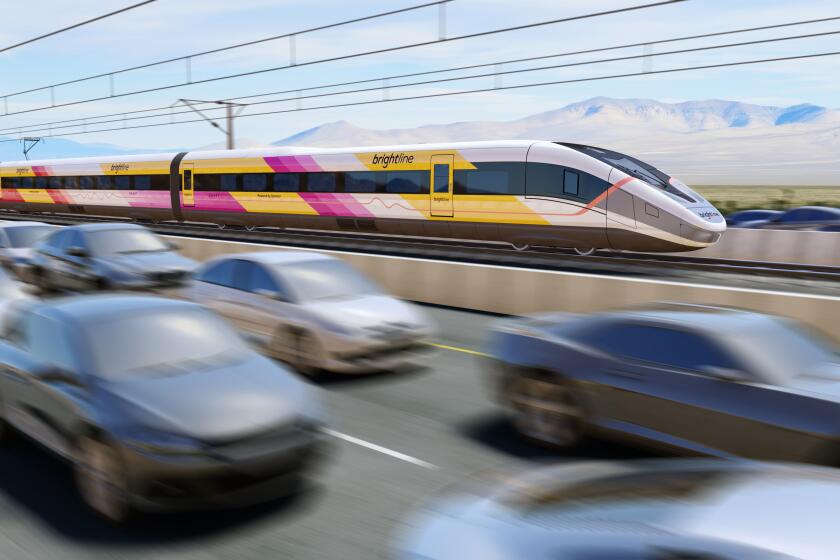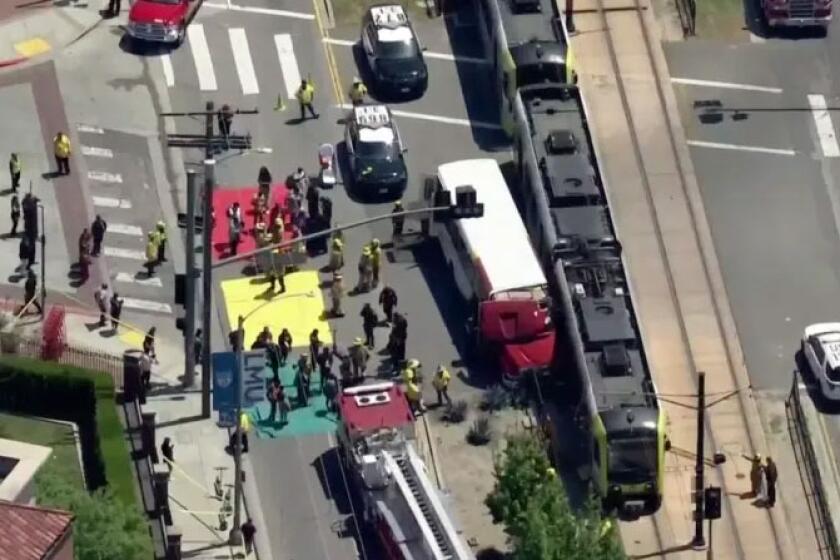PERSPECTIVE ON THE TRAFFIC CRUNCH : On a Highway to Nowhere : Transportation: The ‘smart-car’ concept is a farce that will increase gas consumption and make our roads even more congested.
There is, as Hegel would have noted, an element of farce about the Transportation Department’s initiative to computerize and automate the nation’s autos and highways. At a cost of no less than $80,000 per auto, (and the cost is sure to increase before the project is completed), 100 cars in Orlando, Fla., will be outfitted with computerized dashboard maps. This will demonstrate, according to Transportation Secretary Samuel K. Skinner, that an “array of advanced electronics and communications technology will contribute a great deal toward reducing vehicle delay, increasing highway capacity and improving highway safety.”
The reason that this effort is farce, and not credible research, lies in the never-ending search for a “technical fix” to what is essentially a social problem: the still-growing mismatch between Americans’ living and working patterns. Suburban sprawl and auto dependency are the crux of the problem, rather than axioms of existence as the auto industry, and Skinner, would have us believe. Instead of rethinking our development patterns, rebuilding housing in our urban centers and investing in adequate public transit, it is easier to turn to the auto industry itself for an answer. Not surprisingly, that answer is more, but this time smarter, cars.
Building “smart” cars, it is claimed, will allow a massive increase in the carrying capacity of existing highways (doubling or tripling them, according to Mobility 2000, a group of transportation experts). Not only will this strategy enable the government to avoid expenditures on new highways, it will also make it possible to impose much of the cost of the new technology on individuals, who will have to buy these “improved” autos (if they can afford them). Of course, such a strategy ignores the social and environmental costs of an astronomical growth in the number of autos on our highways. All that smart cars will really do is make it possible to put off, once again, the politically difficult decision to invest in urgently needed regional transit systems.
In the United States, public transit remains an oxymoron; indeed, the goal of the “smart car” project seems to be a major increase in the number of private vehicles using the highways, which will only encourage the proliferation of housing tracts far from commercial and business centers, creating more highway congestion. We might with some profit recall our last technical fix for the traffic problem, the freeway-building boom of the 1960s and ‘70s, as a relevant lesson. In the meantime, we have been convinced that to relinquish our autos is to relinquish our freedom. Instead, we should consider just how free we really are while caught in commuter traffic, forced by housing prices to live in communities distant from our workplaces and unable to chose a more comfortable alternative.
Another argument put forth in support of this project has been heard before: Foreigners are developing the technology and if we don’t, too, they will end up selling it to us. While there might be an element of truth in this fear, we should ask what we will really gain by investing in a technology that is likely to make us consumers of more autos (built by whom?) and more oil (produced by whom?). The fact remains that those foreigners (in Japan and Europe) have developed efficient public transportation systems and have also imposed significant taxes on gasoline consumption, both of which help to reduce auto use and consequent environmental damage. As a result, foreigners probably see the United States, not their own countries, as a promising market for improvements in auto technology.
The “smart car” initiative, as it now stands, is no more than industrial policy disguised as social problem-solving. It is a myopic world view that would allow us to spend scarce dollars on more autos at a time when, as a nation, we are trying to deal with the security threats posed by foreign oil imports and the environmental threats posed by global warming, urban smog and domestic oil production. We might take a moment the next time we are behind the steering wheel to ponder the implicit contradictions in our country’s domestic policies.



